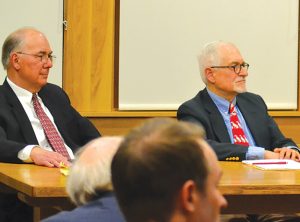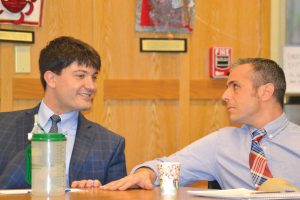*Updated from print edition version
By Ann Needle
A standing-room only crowd attended the lively, 90-minute Bolton Candidates Night, held on April 4 at the Bolton Public Library. The four candidates for Bolton’s contested races this year are: Bob Czekanski and Joe Myerson for the Board of Selectmen; and Michael Horesh and David Yesue for Nashoba Regional School Committee representative.
Selectmen: Focus on Growing Revenue

Throughout their responses to questions posed by the audience, longtime residents Czekanski and Myerson both stressed the need to control town expenses by expanding the tax base.
Incumbent Selectman Bob Czekanski maintained that during the seven years he served on the Bolton Advisory Committee, Advisory’s biggest accomplishment was to slow the growth rate of town expenses. He said that during his first years on Advisory, “We were taxing to the maximum and using free cash in order to balance the budget.”
Challenger Myerson recounted that his service to the town has included three years on the Conservation Commission starting in 2002 and, for the past several years, on Advisory. “During this time, I’ve been looking at the painstaking process of trying to keep the budget under control in the face of amazing forces,” he said. “We can’t keep going on cutting the budget. But we’re facing an awful lot of pressures, and I really think we could take some reasonable steps to broaden the tax base.” He pointed to his support of a meal tax and a potential bylaw allowing limited marijuana cultivation.
Responding to the question of how each candidate would increase tax revenue, Czekanski said the current mixed-use zoning is not used because it is too restrictive. Planning Board articles to increase the footprint of buildings would make it more appealing. He noted he would favor the other Planning Board proposals to increase the footprint of buildings in the existing commercial/industrial zones..
Pinpointing the empty office spaces at the intersection of Route 117 and Interstate 495, and by the Stow town line, he asked, “Why aren’t those buildings used? We make it very difficult for establishments to come into town.”
Czekanski noted that occupied commercial/industrial buildings generate more tax revenue than empty buildings and stated that lack of amenities and too much traffic contribute to the lack of commercial activity in Bolton.
In Myerson’s response to the revenue question, he pointed back to his support for taxes from restaurant meals and small marijuana businesses. He added, “What we need in terms of creativity is to reach out to everyone in town and communicate with everyone. Many people see town government as a closed circle with the same people [running it].” Myerson stressed that, as a journalist by trade, he could expertly reach out and explain the importance of involvement in Bolton affairs.
The use of space across Bolton also came up, when the candidates were asked whether they support a building project for a new or rehabilitated Senior Center.
Myerson termed the concept “somewhere in the middle of our priorities–but that doesn’t mean it should be thrown out.” Along with the need to build contingency funds for such a project, Myerson said, the town also needs a community center as it continues to grow.
Czekanski said he supports developing intergenerational community programs and the town could rent space in vacant commercial buildings if extra space is needed to get the program started. He would support dedicated space for the community programs if the growth and success of those programs were sustained.
The candidates differed on where they stood regarding the nonbinding resolution calling for Bolton to support the Paris Climate Agreement. Both candidates assured they would support debate on the proposal at the May 7 Annual Town Meeting.
But Czekanski dismissed the Agreement as lacking, among other things, a focus on human rights and equality, which he insisted are keys to helping control climate change. Myerson maintained that it is essential for towns such as Bolton to speak out against climate offenders such as fossil fuels, despite any shortcomings in the Agreement.
School Committee: More for Nashoba’s Money

As with the selectman candidates, School Committee candidates Michael Horesh and David Yesue honed in on getting more for the town’s money without aggressively cutting costs.
Speaking of his reason for seeking outgoing member Neal Darcy’s seat on the committee, Horesh pointed to his crucial experience in education, as a science teacher at Lexington High School for the past 10 years. “As an educator, I’m always thinking about what’s best for the kids and what’s best for the community,” he said. Horesh noted he has lived in Bolton for seven years and is raising two young children here.
Yesue spoke of having been born and educated in Bolton, and said that after some time away, he and his wife returned in 2002 to raise their two young children. He has also served on both the Housing and Planning boards.
Responding to questions about what the candidates will emphasize in advocating for Bolton, and what they view as top budget priorities among district facilities, Yesue said, “Education is what drives the popularity of the town. But decisions have to be made. We prioritize; we start at the bottom.” Yesue conceded that this will be especially tough with the high school, which tops his list of facilities needing to be addressed. “The school is tired. I consider myself fiscally conservative, but right now we’re throwing money at it [in repairs].”
Agreeing with Yesue that finding money to address any priority will mean tough decisions on what else is funded, Horesh said he would expect “to be part of a conversation on what our priorities are.” But he stressed that a walk through NRHS was an eye-opener for him. He underscored the science lab conditions, where he recalled seeing a vent letting in snow and drowning out the teacher’s voice when the wind blew.
Horesh expressed a similar view when asked if he supports working toward free full-day kindergarten. Pointing to Nashoba’s budget challenges — including dwindling free cash and grants, he said, “if that’s something the community wishes, that’s great, but we have to look at the budget. We have to look at—where are we going to get the money?” Horesh added, “It will always come to money, and it will always come to democratization.”
Yesue said he personally supports free full-day kindergarten, but would bow to the community’s wishes on whether to formally support it. “It is not really about me. That’s not how I have acted, leading other boards in this town, and that’s not how I would act on the School Committee.”